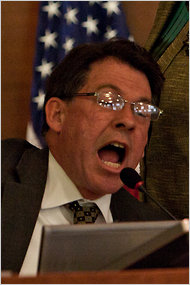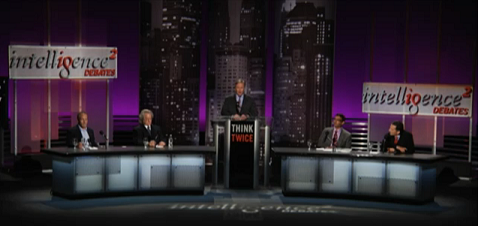Fran Becker: Theocrat, Hypocrite.
Posted in Editorials on June 21st, 2012by Elizabeth
Tags: Nassau County • Politics • Religion • Republicans
Nassau legislator adds God to the debate
Tuesday June 19, 2012 5:02 PM By Celeste Hadrick
Legis. Fran Becker, a Lynbook Republican who is the party’s nominee to run for Congress against Democratic incumbent Carolyn McCarthy (D-Mineola), was looking for divine intervention during Monday’s hectic meeting of the Nassau County Legislature.
As Democrats and Republicans blamed each other for a $41 million hole in last year’s budget, Becker said, “Let’s bring God into the office. Let’s pray about this.”
The 10-member Republican majority wants to borrow the money to pay overdue property tax refunds and fill the budget gap but the legislature’s nine Democrats have refused to provide the three votes needed.
“What would Jesus do?” Becker said.
“Excuuuuse me?” interjected Legis. Judy Jacobs (D-Woodbury).
“Why are you interrupting me?” Becker asked.
“This is so ridiculous,” Jacobs said.
“To say God should be in the audience?” Becker responded.
Later, Becker chided Legis. Kevan Abrahams (D-Freeport) and Robert Troiano (D-Westbury) for not approving the bonding as a way to help save youth group programs in their communities. He noted that he had voted to borrow when Republicans were in the minority on the legislature.
“I did what my God wanted me to do,” Becker said.
Abrahams, leader of the Democratic caucus, said, “I think Mr. Becker’s plan is to argue with people he doesn’t agree with. I guess God is telling him to do that.”
Becker is facing a primary from Frank Scaturro of Hempstead for the Republican nomination next week.

Fran Becker yelling at constituents during a 2011 meeting. Photo credit: Michael Kirby Smith, New York Times.
I’ve written previously about the Nassau County Republicans, and while this appears to be a new low, it’s not really as bad as having campaign staffers yell racial epithets to intimidate people. But it is definitely a new height of absurdity. Mr. Becker is a Catholic. And reading through his outburst, I’m reminded of Matthew 6:5,
And whenever you pray, do not be like the hypocrites; for they love to stand and pray in the synagogues and at the street corners, so that they may be seen by others. Truly I tell you, they have received their reward. But whenever you pray, go into your room and shut the door and pray to your Father who is in secret; and your Father who sees in secret will reward you.
When you are praying, do not heap up empty phrases as the Gentiles do; for they think that they will be heard because of their many words.
This wasn’t a humble display of piety, he was using religion as a weapon, which should be distasteful to the religious and secular alike.
Beyond absurdity, and a blatant disregard for the First Amendment, this is intentionally aggressive. A person who cannot use his negotiating skills to reach a compromise, and must instead issue a combative appeal to the divine, is unfit for public office.
While I’m still endorsing Democrat Carolyn McCarthy in the general election, any Republicans reading are encouraged to support Frank Scaturro.


